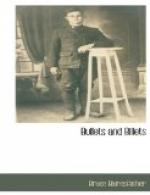At a little after midnight we left the field, marching down the road which led towards the Yser Canal and the village of St. Jean. Our transport remained behind in a certain field that had been selected for the purpose. The whole brigade was on the road, our battalion being the last in the long column. The road from the field in which we had been resting to the village of St. Jean passes through the outskirts of Ypres, and crosses the Yser Canal on its way. I couldn’t see the details as it was a dark night, and the rain was getting worse as time went on. I knew what had been happening now in the last forty-eight hours, and what we were going to do. The Germans had launched gas in the war for the first time, and, as every one knows now, had by this means succeeded in breaking the line on a wide front to the north of Ypres. The Germans were directing their second great effort against the Salient.
The second battle of Ypres had begun. We were making for the threatened spot, and were going to attack them at four o’clock in the morning.
Ypres, at this period, ought to have been seen to get an accurate realization of what it was like. All other parts of the front faded into a pleasing memory; so it seemed to me as I marched along. I thought of our rest at the village, the billets, the Cure, the bright sunny days of our country life there, and then compared them with this wretched spot we were in now. A ghastly comparison.
We were marching in pouring rain and darkness down a muddy, mangled road, shattered poplar trees sticking up in black streaks on either side. Crash after crash, shells were falling and exploding all around us, and behind the burning city. The road took a turn. We marched for a short time parallel to now distant Ypres. Through the charred skeleton wrecks of houses one caught glimpses of the yellow flames mounting to the sky. We passed over the Yser Canal, dirty, dark and stagnant, reflecting the yellow glow of the flames. On our left was a church and graveyard, both blown to a thousand pieces. Tombstones lying about and sticking up at odd angles all over the torn-up ground. I guided my section a little to one side to avoid a dead horse lying across the road. The noise of shrapnel bursting about us only ceased occasionally, making way for ghastly, ominous silences. And the rain kept pouring down.
What a march! As we proceeded, the road got rougher and narrower: debris of all sorts, and horrible to look upon, lay about on either side. We halted suddenly, and were allowed to “fall out” for a few minutes.




